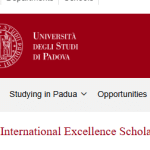Turkey is an Asian-European country and it has its capital as Ankara and the largest city is Istanbul. The official language is Turkish but there are several other languages spoken in the country in which the English language is also one of the languages spoken. The currency of the Turkish country is the Turkish lira (TRY) which is accepted in all the cities in the country.
Although, being a predominantly Islamic country, and according to Wikipedia, the country’s president; President Recep Tayyip Erdoğan is working towards creating and enacting measures to increase the influence of Islam in the country. The country still allows other religious denominations to practice their faith or religion without any form of restrictions.
The educational system of Turkey is of a high standard as their educational standard is in close proximity to that of Europe. The country has about 206 universities with one university in each city. The universities are either privately owned or government universities with accommodation for both its students and international students. The tuition fees are a bit expensive for international students and more expensive when it is a privately owned institution. Turkish citizens and other countries who are from the Turkish Empire pay a cheaper tuition fee as they are recognized as Turkish citizens.
To be able to study in Turkey, there are some criteria which you must consider such as a student visa, living expenses, and also a health insurance policy. There are some universities in Turkey which offer scholarships and grants to help students who are in financial need. It is worthy of note that, Turkey does not allow international students to work while they study but they allow graduates who want to stay back and study to obtain a work permit from their country’s Ministry of Labor before being granted a work opportunity.
Cost of Study and Living in Turkey
The cost of living and studying in Turkey is relatively on average as food and transportation are quite cheap. The cost of study in Turkey is dependent on the program and course of study. As an international undergraduate student, you may be required to pay up to 450 USD to 1500 USD per year, this tuition fee varies because there are privately owned and state universities and private institutions are known to pay more. For postgraduate programs, you will be required to pay about 600 USD – 900 USD per year as an international student. You can pay fewer tuition fees if you are a Turkish citizen or you have a scholarship award. Turkish institutions usually have dormitories that are provided to students as accommodation, unless they chose otherwise to stay outside the school.
Living expenses for an international student can be cheap or high because this varies depending on the student’s general lifestyle. On average, students can spend between 400 USD to 500 USD per month on different living costs such as; transportation, accommodation, food, telephone or internet, and clothing too. There are also private-owned hostels and off-campus accommodation in Turkey and the cost varies depending on the room type and amenities.
Turkey does not offer work permits to its international students that is, the students are not allowed to get a job while studying. As an international graduate student who wants to stay back in the country and work, you need to go back to your country and apply for a work permit through your country’s Ministry of Labor. The work permit is usually issued for the duration of one year but can always be extended up to 3 years.
Another important factor that helps you have a smooth stay living and studying in Turkey is health insurance. Just like most countries that accept international students, you must possess a health insurance policy that will cover all your health issues throughout your course of study or program in the country. For Turkish citizens, the government takes care of their health insurance policies. International students also have to pay about $80 that is approximately 72 Turkish Lira to obtain a residence permit for one year. This means, as an international student you need to obtain this to be able to live and study in Turkey.
See these 10 Most Affordable Countries to Study Abroad for Cheap
10 Reasons Why You Should Study in Turkey
Choosing Turkey as a country for your study abroad option is a great deal, compared to studying in the UK, USA or other European countries, Turkey’s living expenses are relatively on the cheap side giving room to students to choose their lifestyle and enjoy their studies. Turkey is known to be very welcoming and accommodating to international students and their higher education system is top-notch. There are different fantastic reasons for you to study in Turkey but in this article, we are going to outline 10 reasons why Turkey is a good study option.
- Cultural heritage: Turkey has numerous cultural monuments and diverse heritage with some monuments under the UNESCO cultural heritage. Turkey is home to diverse cultural backgrounds and this makes it easy for international students and tourists to relate and interact well with the locals. The monuments in Turkey dates back so many years and has been preserved for a long time. All of these also serve as tourist attractions for foreigners and Turkish students who may be studying cultural arts and related courses.
- Quality higher education: with over 206 universities in Turkey both private and government-owned, Turkey stands as one of the countries with a good educational system. The university certificate awarded in any institution in Turkey is well recognized and accepted in any European country. The Turkish universities are well equipped with good instructors and different laid out course options and programs you can make a choice of. The higher education in Turkey is of high quality because it is in engagement with the European higher education standard.
- Nature at its peak: Turkey is blessed with different natural elements, such as mountains, rivers, oceans and so much more. Turkey experiences four main seasons; winter, summer, spring and autumn which displays their different natural beauties all year round.
- Student friendly environment: just as the Turks are welcoming to foreigners, this makes the schooling environment friendly for international students. There are different socializing places to visit and enjoy the environment. From clubs, restaurants, cinemas and other recreation centers for students. Getting involved with the locals is also a very pleasant idea. You would surely enjoy your stay in Turkey because there are different fun things to do.
- Welcoming locals: the Turkish people are very accommodating to foreigners and this makes it a good choice for studying abroad. The Turks are welcoming to international students, giving different food and cuisines to people of different tribes, also you can learn the language as you interact with the local people and the environment.
- Easy living conditions: as stated earlier, the living expenses in Turkey is relatively cheap as compared to other top European countries. There different housing choices for you to make depending on your pocket size and basic wants. Transportation, food, and entertainment are also cheap and you would enjoy the environment very much.
- Work opportunities: despite the fact that Turkey does not permit international students to work while they study, during breaks, some institutions avail internship opportunities for students as research assistants. Also after obtaining your work permit from your country’s Ministry of Labor, as a graduate who wants to work in Turkey, there will be different work opportunities made available for you. Jobs are easy to get once you have all the necessary documents, your work permit, and also your certificate of study. The work permit is usually issued for a one-year duration but it can always be extended for up to three years.
- Availability of different courses: with over 206 universities in Turkey, you have a wide range of courses to choose from. The Turkish universities offer different degree programs whether undergraduate or postgraduate programs. There are over 60,000 courses in the whole of the universities; from sciences, humanities or Arts for you to choose from and study. The availability of courses makes it very easy for students who may not be sure of what they want to study or what choice of course to make.
- Accommodation: housing in Turkey is on a cheap range, most universities offer accommodation on the campus for both its students and international students too. There are dormitories, off-campus accommodation, and also privately run hostels for students. As an international student and depending on your choice of accommodation, you can expect to spend averagely about $50 – $300 per month on accommodation.
- Tourist attractions: blessed with natural ambiance, Turkey is a sure a tourist center for foreigners. There are different places to visit some of which are the rivers, mountains where you can ski and oceans. The country is filled with a beautiful landscape which attracts people from other countries of the world.
Studying abroad can feel very challenging but it is as much fun when well prepared for. If you get all your documents and source of income together, you will have no complaints. Turkey is a good study destination because its educational system is in reference to that of other European countries and the certificates awarded in any Turkish university are recognized in almost all European countries. Turkey experiences the four weather seasons; autumn, winter, spring, and summer making it a great place for visitation and study all year round. Although, spring (April-May) and autumn (September -November) the best times to visit Turkey. A country is sure a great place for international students to study abroad.










